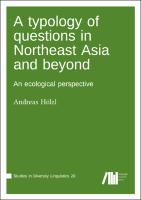A typology of questions in Northeast Asia and beyond
An ecological perspective
Author(s)
Hölzl, Andreas
Collection
Knowledge Unlatched (KU)Number
103597Language
EnglishAbstract
This study investigates the distribution of linguistic and specifically structural diversity in Northeast Asia (NEA), defined as the region north of the Yellow River and east of the Yenisei. In particular, it analyzes what is called the grammar of questions (GQ), i.e., those aspects of any given language that are specialized for asking questions or regularly combine with these. The bulk of the study is a bottom-up description and comparison of GQs in the languages of NEA. The addition of the phrase and beyond to the title of this study serves two purposes. First, languages such as Turkish and Chuvash are included, despite the fact that they are spoken outside of NEA, since they have ties to (or even originated in) the region. Second, despite its focus on one area, the typology is intended to be applicable to other languages as well. Therefore, it makes extensive use of data from languages outside of NEA. The restriction to one category is necessary for reasons of space and clarity, and the process of zooming in on one region allows a higher resolution and historical accuracy than is usually the case in linguistic typology. The discussion mentions over 450 languages and dialects from NEA and beyond and gives about 900 glossed examples. The aim is to achieve both a cross-linguistically plausible typology and a maximal resolution of the linguistic diversity of Northeast Asia.
Keywords
LinguisticsDOI
10.5281/zenodo.1344467ISBN
9783961101023OCN
1076644690Publisher
Language Science PressPublisher website
https://langsci-press.org/Publication date and place
Berlin, 2018-08-29Grantor
Imprint
Language Science PressSeries
Studies in Diversity Linguistics,Classification
Linguistics


 Download
Download